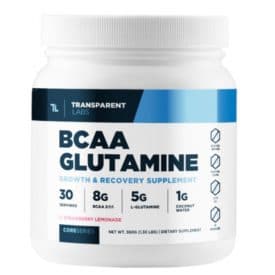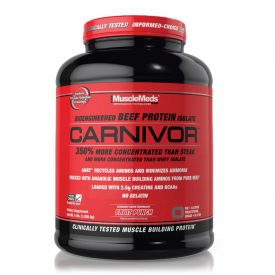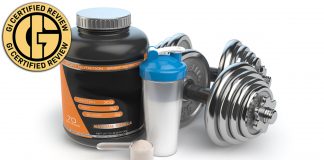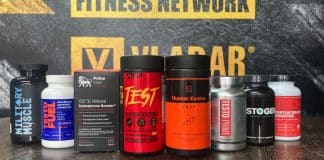Are BCAAs or protein powders the better supplement?
Two of the most popular nutrition supplements in today’s world of bodybuilding and fitness are none other than branched chain amino acids, often referred to as BCAAs, and protein powders. While they are not necessarily the same category, there appears to be some debate as to whether one is more beneficial than the other.
Proponents of protein powders argue the case that having a full spectrum of amino acids is most important. Conversely proponents of BCCAs argue the case for the propensity of mTOR activation by leucine, and thus its ability to stimulate muscle protein synthesis (MPS).
So is one supplement really more advantageous than the other, or is it a question of timing?
This article reviews the purported benefits and limitations of both BCAAs Vs protein powders. It also takes an in-depth look at exactly when to use each supplement for optimum results.
BCAA Supplements Overview
BCAAs refer specifically to three amino acids; leucine, isoleucine, and valine. As it turns out, these amino acids are also deemed essential because that they cannot be synthesized endogenously by the body.
However despite their essential status, these three amino acids are primarily referred to as branched chain amino acids because of their characteristic branched molecular structure that sets them apart from the other 21 amino acids found in the human genetic code.
With regard to the benefits of BCAA supplements in bodybuilding, the efficacy of these supplements is well-documented with various known physiological modes of effect. Arguably, the most important two exploits of BCAAs are the anti-catabolic effects during exercise, and the activation of the anabolic mTOR pathway.
BCAA supplements exhibit anti-catabolic properties
During exercise hard working skeletal muscles can often be subject to catabolism. Seasoned sports coach and nutrition expert Paul Jenkins MSc from dna lean, systematically explains this process in his article:
“Exercise causes skeletal muscles to release significantly large amounts of the non-essential amino acids, glutamine and alanine. The amount released is dependent on various factors, such as exercise intensity and duration.”
Nonetheless, glutamine and alanine loss can soon exceed amounts available in the amino acid pool, thus leading to a deficit of these two amino acids. To compensate for this loss, the body catabolises muscle proteins to release the essential branch chained amino acids, leucine, isoleucine and valine.
These BCAAs are then used as a substrate to synthesize the non-essential amino acids, glutamine and alanine, and thus restore the balance.”
Consequently, consuming BCAA supplements before your workout can help to preserve muscle mass. For any trainer looking to increase their gains, and especially for bodybuilders in their pre-contest phase, this is an absolute must.
BCAA Supplements trigger the mechanistic target of rapamycin (mTOR) pathway
Bodybuilding and muscle growth is synonymous with muscle protein synthesis; the anabolic process of muscle hypertrophy. mTOR is a myogenic pathway that signals the biological process of muscle protein synthesis.
Branched chain amino acids, especially leucine, are known to activate mTOR and muscle protein synthesis. In fact, according to this study a dose of as little as 5.6 grams of BCAAs taken post resistance-exercise, stimulated a 22% greater response in muscle protein synthesis compared to a placebo group.
Furthermore, various other studies give further credence to the ability of BCAAs in triggering a positive shift in protein metabolism while decreasing the rate of protein degradation.
Is there any wonder why BCAA supplements have become a go-to in such a substantial amount of bodybuilders supplement arsenals?
The limitations of BCAA supplements
So we just learnt that BCAAs are significantly important for muscle building, but they do have their limitations. Triggering muscle protein synthesis is but part of the equation of achieving calisthenics workout. This is because even when triggered, protein synthesis cannot and will not occur given an insufficiency of any single of the nine essential amino acids.
This paper by Robert R Wolfe from the University of Arkansas methodically states:
“The overriding metabolic goal of consuming BCAA supplements is to maximize the anabolic state. It is widely asserted that BCAAs induce an anabolic state by stimulating muscle protein synthesis. An abundant availability of all EAAs is a requisite for a significant stimulation of muscle protein synthesis.”
Therefore essential amino acids (EAAs) are a rate-limiting factor of muscle protein synthesis. Nevertheless, BCAA supplements used on their own are still a useful tool for bodybuilders to help protect against muscle catabolism.
Additionally, supplementation of BCAAs can further spike muscle protein synthesis which can be beneficial when combined with a sufficient enough intake of protein.
Protein Powders Overview
Now on the other side of the BCAAs vs. protein powder debate, protein powders are large macromolecular structures, comprised of countless sequences of amino acids all bonded together in one super massive molecule. Most protein powder supplements are manufactured from first class protein sources such as whey and therefore contain all of the 9 essential amino acids.
The primary benefit of protein powder supplements is the amount and quality of protein that can be quickly and conveniently delivered.
Protein powder supplements are not rate-limiting for protein synthesis
It is for this reason that, for example, the only rate-limiting factor behind whey protein powder and muscle protein synthesis is the amount of it that you consume. Throwing down a whopping 60 gram serving of whey protein is sufficient enough even for a massive 250 lb bodybuilder to maintain an anabolic state.
Conversely, a mere 5 gram serving of even the purest whey protein powder isn’t sufficient enough to maintain an anabolic state for a non-bodybuilding individual let alone a beastly 250lb bodybuilder.
Thus protein anabolism is the net product of overall protein intake and amino acid availability.
The limitations of protein powder supplements
Since protein powders are comprised of amino acids, in order for the body to access the amino acids, the proteins first need to be digested. This is of course a complex process and takes time. It is therefore not advantageous to consume protein powder intra-workout, as it is with BCAAs.
This is because the digestive blood flow needed to fully and properly digest the protein is unavailable. Instead blood-flow is directed to hard-working skeletal muscles, leaving the protein with a longer gut transit time.
Finally, because protein powders require digesting, leucine, isoleucine, and valine experience latency in entering the bloodstream and metabolism, and therefore are unable to spike protein synthesis as rapidly as free-form BCAA supplements do.
Our Recommendations
Now, that we have discussed BCAAs vs. Protein Powder, let’s take a look at which ones to choose. We definitely have our recommendations for BCAAs and protein powders, so let’s take a look.
Transparent Labs CoreSeries BCAA
Transparent Labs BCAA Glutamine is designed for repair and recovery and is a 100% clean formula. With 5 great ingredients, the added glutamine works for better growth and reduced fatigue.
Transparent Labs CoreSeries BCAA Glutamine is our favorite option for a BCAA supplement, as it offers all the benefits of a BCAA supplement, but also gives the you the benefits of L-glutamine in the formula, which helps to inhibit protein breakdown, and reduce fatigue. It is designed with recovery in mind, and Transparent Labs has crafted a 100% clean formula with a fully transparent label so you know exactly what you are getting. It contains 5 active ingredients and has a 2:1:1 ratio of BCAAs for all of the intended effects and benefits.
MuscleMeds Carnivor
Carnivor is a 100% beef protein isolate that is fast digesting and great tasting for an effective non-dairy protein supplement.
Now, our recommended protein powder is none other than MuscleMeds Carnivor, which is a beef protein, rather than a whey, so it is something anyone can use, even if they have digestive issues or cannot tolerate dairy. With 23 grams of fast digesting hydrolyzed beef protein, MuscleMeds Carnivor is designed the individuals who seek to enhance training, build muscle faster, and perform at their best. It also comes in numerous delicious flavors, and has no fat and very little carbohydrates, so you can fit this in even the most restrictive diets.
BCAAs vs. Protein PowderFAQs
Are BCAAs even worth it?
Some people say that BCAAs are just junk supplements, so you may be asking if they are even worth buying. However, they have been proven to help with things such as recovery and repair of muscles, making them a great choice of supplement.
Isn’t a good diet enough?
A good diet certainly helps you to hit your protein intake and get some BCAAs in your system, but it may not always be enough. That is why we turn to supplements, to get the correct amount of each nutrient in.
Conclusion
When it comes to BCAAs vs. Protein Powder, both are best used alongside a balanced diet naturally high in protein from whole foods.
BCAAs are not intended to be used as a replacement for complete proteins. Nevertheless, they can be used with great efficacy when taken either pre-exercise or intra-workout to protect against exercise-induced muscle catabolism, and to help spike protein synthesis.
Protein powder supplements are a quick and easy way to boost overall daily protein intake without having to gobble down copious amounts of chicken breasts or canned tuna. They are additionally highly efficacious when taken post-exercise to help aid recovery and facilitate muscle growth.
Combining both supplements together, as set out in this article, in conjunction with a sufficient daily intake of protein, is optimal for any athlete or bodybuilder seeking to gain an anabolic edge.


















